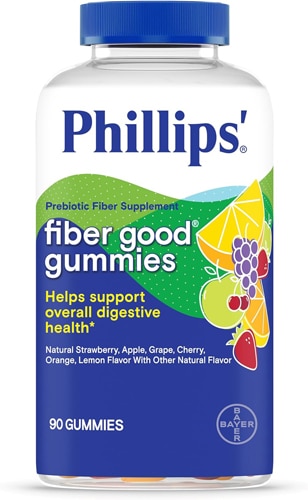Remember your grandparents almost religious devotion to prunes or prune juice? They were on to something. As your mother and grandmother probably told you, you need to eat more fiber. Why? Fiber is an essential but overlooked part of a healthy diet. It keeps you regular, aids weight loss and can keep blood sugar levels steady. Although fiber’s best-known super power is its ability to prevent or relieve constipation, it may also help with other digestive issues. Its effects reverberate throughout the body and lays an essential foundation for health.†
What is fiber, exactly?
Fiber provides the bulk in food—the parts that your body can’t digest—to help food move through the digestive system and out your body. There are two kinds of fiber: soluble (dissolves in water) and insoluble. Both have unique properties and are important for health. Soluble fiber absorbs water, turns it into a gel, and slows digestion (in a good way by helping you feel fuller longer). Found in barley, oat bran, beans, nuts, seeds, peas, lentils, pears, strawberries and blueberries, it can help lower cholesterol and stabilize blood sugar levels.
Insoluble fiber, found in wheat bread, couscous, barley, brown rice, bulgur, seeds, carrots, cucumbers, zucchini, celery and tomatoes, increases stool bulk and moves food more quickly through the intestines, aiding elimination and preventing constipation.
How much do you need?
The gold standard is 14 grams of fiber for every 1,000 calories of food, which equates to 25 grams of fiber for women and about 30 for men.
Great ways to get it
Dietary fiber is found mainly in fruits, vegetables, whole grains and legumes, and nuts and seeds. The more processed the food, the less the fiber. Read labels to understand how much fiber the product contains. If you focus on a plant-based diet, and eschew processed food, you will get plenty of fiber.
Uplevel your fiber:
- Opt for whole grains when it comes to bread, rice and pastas.
- Instead of drinking fruit juice, which has little fiber, eat a piece of fruit.
- Make snacks count by choosing fresh fruits, raw vegetables, low-fat popcorn and whole-grain crackers.
- Add beans or lentils, a fantastic source of fiber, to soups, main dishes and stews.
- Add chia seeds to smoothies, yogurt, oatmeal and cereal.
Fiber supplements and fortified foods
In most cases, whole foods are better than fiber supplements. Fiber supplements typically don't provide all the extras — the variety of fibers, vitamins, minerals and other beneficial nutrients that foods do. But some people may need a fiber supplement if they are not yet committed to making changes to their diet or if they have certain medical conditions. It’s always a good idea to check with your doctor before taking fiber supplements.
You can also get more fiber by eating foods with fiber added. Cereal is the main one, but granola bars, yogurt, and even ice cream have fortified versions. The added fiber tends to be labeled as "inulin" or "chicory root." Be forewarned, however, as some foods with added fiber may produce extra gassiness.
How to know when it’s enough
Increase your fiber gradually. Eating too much fiber, too fast, can cause gas, bloating and cramps. Also make sure you drink enough water: This helps the fiber pass through the digestive system. Regular bowel movements, with stools that are soft and bulky, is a good indication that you are on the right track.
†These statements have not been approved by the Food and Drug Administration. These products are not intended to diagnose, treat, cure or prevent disease.




